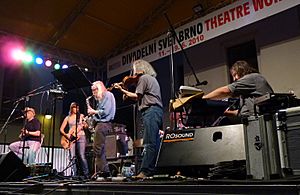The Plastic People of the Universe facts for kids
The Plastic People of the Universe (often called PPU) is a rock band that started in Prague, Czechoslovakia (which is now the Czech Republic). They formed in the 1960s and became very important for their music and for standing up for artistic freedom. For many years, the band's leader was the bass player Milan "Mejla" Hlavsa. Today, the saxophonist Vratislav Brabenec is a key member. The band became well-known because they faced challenges from the communist government in their country, which tried to stop them from playing their music freely.
Quick facts for kids
The Plastic People of the Universe
|
|
|---|---|

from left to right: Joe Karafiát, Eva Turnová, Vratislav Brabenec, Jiří Kabeš and Josef Janíček
|
|
| Background information | |
| Origin | Prague, Czechoslovakia |
| Genres | Rock, experimental rock, Prague underground |
| Years active | 1968–1988 1997–present |
| Labels | Globus Guerilla |
| Associated acts | Půlnoc Fiction DG 307 Velvet Underground Revival Garage |
| Members | Vratislav Brabenec Josef Janíček Jiří Kabeš Eva Turnová Joe Karafiát Jaromír Kvasnička |
| Past members | Milan "Mejla" Hlavsa Paul Wilson Jan Brabec Ivan Bierhanzl Pavel Zeman Ludvík "Eman" Kandl |
Contents
The Band's Beginnings and Music
The Plastic People of the Universe started playing music in 1968. Their style was a mix of rock and experimental sounds. They were part of what was called the "Prague underground" movement. This meant they played music that was not officially approved by the government.
Their first official album, Egon Bondy's Happy Hearts Club Banned, was released in 1974. On this album, they used poems by a writer named Egon Bondy and turned them into songs. Their music was unique and different from what was popular at the time.
Challenges with the Government
During the time the band was active, Czechoslovakia was under a communist government. This government had strict rules about art and music. It wanted to control what people could create and listen to. The Plastic People of the Universe did not follow these rules. They played their own kind of music and did not try to get official permission.
Because of this, the government saw them as a problem. They were not allowed to play concerts easily, and their music was not played on official radio stations. Some members of the band were even arrested and put in prison for their music. This made them famous as a symbol of artistic freedom and resistance against the government's control.
Important Albums and Recordings
The band created many albums and recordings over the years. These recordings often captured their live performances. Here are some of their notable works:
- Muž bez uší (live recordings from 1969-1972)
- Vožralej jak slíva (live recordings from 1973-1975)
- Egon Bondy's Happy Hearts Club Banned (1974)
- Pašijové hry velikonoční (1978)
- Jak bude po smrti (1979)
- Líně s tebou spím - Lazy Love / In Memoriam Mejla Hlavsa (2001)
- Maska za maskou (The Mask Behind the Mask) (2009)
The Band's Legacy
The Plastic People of the Universe stopped playing together for a while in 1988. But they reunited in 1997 and have been performing since then. Their story is an important part of the history of the Czech Republic. They showed how music and art can be powerful tools for expressing ideas and standing up for what you believe in, even when it is difficult. Their fight for freedom inspired many people.
Images for kids
See also

 | Selma Burke |
 | Pauline Powell Burns |
 | Frederick J. Brown |
 | Robert Blackburn |



